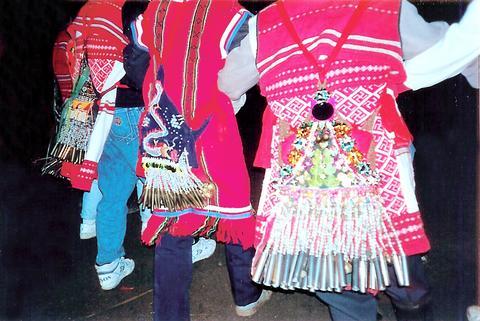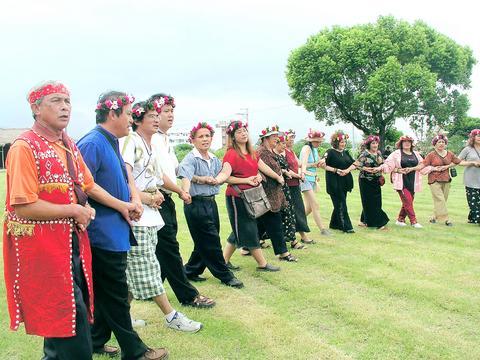Drinking, singing and dancing are expected to take place deep in the mountains of Miaoli and Hsinchu when the "Ritual of the Little Black People" (
For the past 100 years or so, the Saisiyat tribe (

PHOTO: TAIPEI TIMES
In fact, the short, black men the festival celebrates are one of the most ancient types of modern humans on this planet and their kin still survive in Asia today. They are said to be diminutive Africoids and are variously called Pygmies, Negritos and Aeta. They are found in the Philippines, northern Malaysia, Thailand, Sumatra in Indonesia and other places.

PHOTO: TAIPEI TIMES
Chinese historians called them "black dwarfs" in the Three Kingdoms period (AD 220 to AD 280) and they were still to be found in China during the Qing dynasty (1644 to 1911). In Taiwan they were called the "Little Black People" and, apart from being diminutive, they were also said to be broad-nosed and dark-skinned with curly hair.
After the Little Black People -- and well before waves of Han migrations after 1600 -- came the Aboriginal tribes, who are part of the Austronesian race. They are thought to have come from the Malay Archipelago 6,000 years ago at the earliest and around 1,000 years ago at the latest, though theories on Aborigine migration to Taiwan are still hotly debated. Gradually the Little Black People became scarcer, until a point about 100 years ago, when there was just a small group living near the Saisiyat tribe.

PHOTO: TAIPEI TIMES
The story goes that the Little Black People taught the Saisiyat to farm by providing seeds and they used to party together. But one day, the Little Black People sexually harassed some Aboriginal women. So, the Saisiyat took revenge and killed them off by cutting a bridge over which they were all crossing. Just two Little Black People survived. Before departing eastward, they taught the Saisiyat about their culture and passed down some of their songs, saying if they did not remember their people they would be cursed and their crops would fail.
The Saisiyat kept their promise and have held the Ritual of the Little Black People every year, though they scaled down the ceremonies during the Japanese colonial period (1895 to 1945). Now the ritual is held every two years on the 10th full moon of the lunar calendar, with a big festival once every 10 years. At this time, the Saisiyat are not supposed to fight and they congregate in their ancestral areas of Miaoli and Hsinchu, in the mountains.
"I've seen it written of as a celebration, but to me it seemed quite a mournful affair, especially in the way the music came across, which was trancelike, a haunting kind of chant with a series of 10 to 15 songs," said long-term Taiwan resident Lynn Miles, who has been to the ritual three times and will be going again this year.
"There's nothing else quite like it in its tone and in its mood. I've been to other festivals but this is non-stop."
Miles said the dances were not set pieces but usually involved holding hands and moving around in a circle, chanting, with those who know the songs doing most of the singing and a shaman figure keeping order.
A spokeswoman at the Council of Indigenous Peoples (under the Executive Yuan) said that those who have "unclean thoughts" have their souls snatched by the spirits of the Little Black People and will pass out until the shaman revives them.
Miles said the shaman seemed to serve a public-order function by chasing off those who were too drunk or out of order.
The ceremonies are held in two places. The ritual began yesterday in Nanchuang Township, Miaoli County, and will carry on there until Monday. Rituals start today in Wufeng Township, Hsinchu County, and will last through tomorrow.
Getting there:
To Wufeng:
Route 122 to Wufeng can be accessed off No. 1 Highway near Toufen.
To Nanchuang:
Take western No. 1 Highway. Near Toufen, take Route 124 toward Sanwan to Nanchuang. Shuttle buses will take visitors to the ritual site at Xiangtian Lake.

On April 26, The Lancet published a letter from two doctors at Taichung-based China Medical University Hospital (CMUH) warning that “Taiwan’s Health Care System is on the Brink of Collapse.” The authors said that “Years of policy inaction and mismanagement of resources have led to the National Health Insurance system operating under unsustainable conditions.” The pushback was immediate. Errors in the paper were quickly identified and publicized, to discredit the authors (the hospital apologized). CNA reported that CMUH said the letter described Taiwan in 2021 as having 62 nurses per 10,000 people, when the correct number was 78 nurses per 10,000

As we live longer, our risk of cognitive impairment is increasing. How can we delay the onset of symptoms? Do we have to give up every indulgence or can small changes make a difference? We asked neurologists for tips on how to keep our brains healthy for life. TAKE CARE OF YOUR HEALTH “All of the sensible things that apply to bodily health apply to brain health,” says Suzanne O’Sullivan, a consultant in neurology at the National Hospital for Neurology and Neurosurgery in London, and the author of The Age of Diagnosis. “When you’re 20, you can get away with absolute

May 5 to May 11 What started out as friction between Taiwanese students at Taichung First High School and a Japanese head cook escalated dramatically over the first two weeks of May 1927. It began on April 30 when the cook’s wife knew that lotus starch used in that night’s dinner had rat feces in it, but failed to inform staff until the meal was already prepared. The students believed that her silence was intentional, and filed a complaint. The school’s Japanese administrators sided with the cook’s family, dismissing the students as troublemakers and clamping down on their freedoms — with

As Donald Trump’s executive order in March led to the shuttering of Voice of America (VOA) — the global broadcaster whose roots date back to the fight against Nazi propaganda — he quickly attracted support from figures not used to aligning themselves with any US administration. Trump had ordered the US Agency for Global Media, the federal agency that funds VOA and other groups promoting independent journalism overseas, to be “eliminated to the maximum extent consistent with applicable law.” The decision suddenly halted programming in 49 languages to more than 425 million people. In Moscow, Margarita Simonyan, the hardline editor-in-chief of the